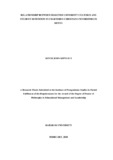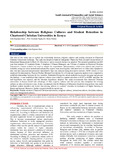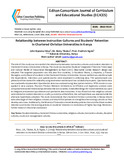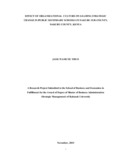RELATIONSHIP BETWEEN SELECTED UNIVERSITY CULTURES AND STUDENT RETENTION IN CHARTERED CHRISTIAN UNIVERSITIES IN KENYA
Abstract
This study sought to address the problem of low student retention in Chartered Christian
Universities in Kenya. University cultures make up the academic and social
environment in any university and are therefore key to students‘ retention. The purpose
of this study was to establish the relationship between selected university cultures and
student retention in Chartered Christian Universities in Kenya. The following objectives
guided the study; to establish relationship between religious cultures, instruction
cultures, discipline cultures and study cost management cultures and student retention in
Chartered Christian Universities in Kenya. The significant of the study was in policy
review and formulation. The study was based on Students‘ Integration Theory by Tinto
(1993) and Cultural Model of Educational Management by Bush (2011). The descriptive
survey research design was adopted. The targeted population comprised of 604yearfour
students, 12Academic Deans, 5 chaplains, 5 Finance Managers, and 5 Deans of students
in Chartered Christian Universities located in Nairobi, Kiambu, Machakos and Kericho
counties. Census method was used to sample the respondents. Questionnaire and
interviews were used to collect data. The questionnaire was piloted at Tangaza
University and tested for reliability using test retest method and was validated by
experts. The outcome of the tests showed that the intraclass correlation value was >.9 for
both tests and the test was significant (p<.05) hence the tool was reliable for data
collection. The qualitative data was cleaned for errors, coded, assigned labels and
grouped for related themes. Quantitative data was analysed using descriptive statistics
such as means and percentages and reported in tables and figures. Data analysis was
done using tools in SPSS version 22. Pearson Product Moment Correlations CoEfficient,
Analysis of Variance and regression analysis were computed to establish
relationships between selected university cultures and student retention. The Embedded
Design for mixed methods was used to integrate and present the quantitative and
qualitative data outcomes. It was found out that religious cultures were related to student
retention (r=0.437; p=0.000). On objective two, instruction cultures were related to
student retention (r=0.482; p=0.000). Objective three shows that discipline cultures were
related to student retention (r=0.591; p=0.000) and objective four; the result showed
study cost management cultures were related to student retention (r=0.647; p=0.000).
From these findings, all the four null hypotheses were rejected, and the alternate
hypotheses adopted, meaning there is statistically significant relationship between
university cultures and student retention in chartered Christian universities in Kenya.
The Study recommends that chartered Christian universities in Kenya should take
advantage of their cultures and should come up with policies to strengthen the existing
cultures as they come up with new ones. The study recommends further that the
Ministry of Education should develop policies that could facilitate student retention and
review the existing policies on student retention in institutions of higher learning in
Kenya and beyond. In addition, studies are recommended in other Christian universities
which did not start as theological colleges, other private universities and in public
universities to establish the relationship between university cultures and student
retention.
Collections
Related items
Showing items related by title, author, creator and subject.
-
Relationship between Religious Cultures and Student Retention in Chartered Christian Universities in Kenya
Kitur, John Kiptanui; Ngala, Fredrick; Tikoko, Betty (Saudi Journal of Humanities and Social Sciences, 2019-11)The role of this study was to explain the relationship between religious cultures and student retention in Chartered Christ ian Universit ies in Kenya. The study was based on Students’ Integration Theory by Tinto [1] and ... -
Relationship between Instruction Cultures and Students’ Retention in Chartered Christian Universities in Kenya
Kitur, John Kiptanui; Tikoko, Betty; Ngala, Fredrick (Editon Consortium Journal of Curriculum and Educational Studies (ECJCES), 2019-12)The role of this study was to establish the relationship between instruction cultures and student retention in Chartered Christian Universities in Kenya. The study was based on Students’ Integration Theory by Tinto ... -
EFFECT OF ORGANIZATIONAL CULTURE ON LEADING STRATEGIC CHANGE IN PUBLIC SECONDARY SCHOOLS IN NAKURU SUB-COUNTY, NAKURU COUNTY, KENYA
THUO, JANE WAMUYU (Kabarak University, 2015-11)The purpose of this study was to investigate the effect of school culture on leading strategic change in public secondary schools especially in Nakuru Sub-County. The specific objectives were to examine the effect of ...




